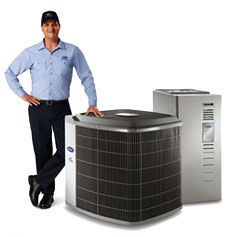What are the advantages of working in the heating or cooling industry, also called the HVAC industry?
You are always in demand, no matter where you live or work.
Almost the entire country has heating and cooling equipment. In those few areas where it is too hot to have heaters, everyone has air conditioning. In those areas where it is too cold to bother with air conditioners, heaters are universal. Even temperate regions like the San Francisco bay area that seem to have perfect weather use heat pumps to offset overly warm days and chilly nights.
The heating and cooling industry offers work year round.
HVAC equipment can go out at any time of the year. Maintenance is ongoing. And in
facilities with climate control like laboratories, climate controlled storage and refrigeration facilities, you can find full time, year round work with large employers. If you learn how to perform weatherization and home energy audits, you’ll have work that is easy to do during the spring in fall when heating and cooling system jobs no longer command a premium wage.
The heating and cooling industry does not require a four year degree, but it offers excellent wages.
Depending on the program you take and the certifications you complete, an HVAC training program will take one to two years. Upon entering the field, you will make an average salary of $42,000 a year. Twenty dollars an hour is a common wage, though some metropolitan areas pay even more. This is higher pay than many liberal arts majors receive, while spending half or a third as much time in school.
Your job cannot be outsourced.
Many people are afraid to go into manufacturing, IT or engineering because they are afraid of their job being outsourced to Asia, Mexico or India. While the HVAC equipment may have been made overseas, only someone living here can do the repairs. Repairing a condenser or adding refrigerant to an AC cannot be done remotely by
someone in India.




